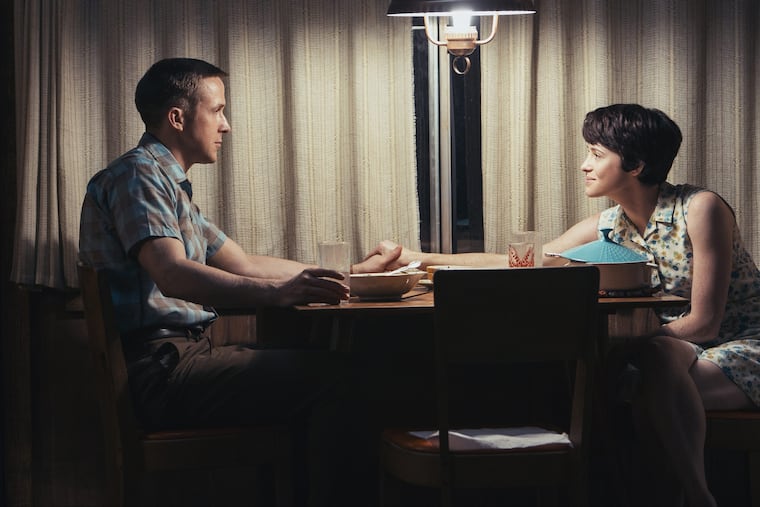‘First Man’: A gritty, inspiring look at the sacrifices that put a man on the moon
In 'First Man,' Ryan Gosling plays astronaut Neil Armstrong, whose heroism is measured by the tragedy he endured on his way to his famous moon landing.

One of the most riveting things about First Man: the focus on actual rivets.
They are there to remind us of the urgency of the space race and the expediency it fostered — sending expendable men into space in hastily assembled machines, rattled apart by turbulence, repaired by people using Swiss Army knives. This sense of precariousness is driven home in the very first scene — test pilot Neil Armstrong (Ryan Gosling) wrestling with the unresponsive controls of X-15 (or X-20), wrenching the crude stick as if it were the gearshift on a lurching John Deere tractor.
The aircraft plummets from the outer layer of the atmosphere toward earth. By skill or by luck he is able to level out and land roughly in the dry bed of a salt lake, and for his efforts, is grounded.
No one says it, but he nearly lost precious equipment. Precious because we're in the middle of the Cold War, fought as a contest of technology and prestige, measured by incremental steps – sound barriers, orbits, space walks, and the ultimate prize of the moon landing. When Armstrong's test-pilot career plateaus, he applies for a job in the National Aeronautics and Space Administration, which is looking for men for its developing Gemini space exploration program.
"It's a fresh start," says his wife Janet (Claire Foy), as the two head south to Houston.
There is a lot of weight behind that line. Neil's lost his job, and the couple has just lost their only daughter, only 2 years old, to complications from cancer treatment. Director Damien Chazelle (La La Land) links the two in the prologue – Armstrong in his flying tin can, then an abrupt cut to a crude, colossal, clunking radiation machine as it descends on his daughter's tiny body.
These scenes explain the skepticism that we often see in the eyes of Janet (played with stern rigor by The Crown's Foy), who learns not to put undue faith in science and technology (she and Neil attend four test pilot funerals in a single year).
The movie quotes JFK as saying the United States chooses to go to the moon not because it is easy, but because it is hard – First Man show us just how hard. We watch Armstrong become one of the first men to dock with another craft in space (an important precursor to the moon mission). It succeeds initially, but the conjoined vehicles spin wildly out of control and Armstrong saves the mission while on the verge of blacking out (Chazelle emphasizes the visceral feeling of these life-and-death roller-coaster moments).
Soon after two friends perish in a plane crash, and more deaths follow, the consequences falling hard on the close-knit circle of astronaut families in their Houston cul-de-sacs. The extraordinary nature of this attrition contrasts with the ordinary way they live — little ranch homes, kids running around in Daniel Boone caps, barbecues, beer — the kind you punctured with a can opener — on the porch. Except that one by one (or three by three), the men stop coming home from work.
Throughout these ordeals, we begin to get a sense of why Armstrong's famous stoicism made him a strong candidate for the Gemini and Apollo programs, and we see why he was chosen to lead the first moon-landing mission. He was unflappable to the point of being aloof. Only at his wife's insistence does Neil face his two boys the night before his famous moon mission, to address the issue that he might not return.
There's about a 50-50 chance of success, he concedes. Any questions?
He's not an easy man to read, and he's not meant to be (Foy carries most of the emotional load). First Man relies on Gosling's own low-rev screen presence to hold the viewer's interest.
Not until we reach the surface of the moon does the movie really venture into his head (almost literally in terms of camera point of view). The event was tightly scripted by NASA, and Armstrong was a dutiful astronaut, but there were a few minutes when he broke protocol, and wandered off for a few minutes alone, staring into the black hole of a crater.
In speculating about this moment, Chazelle suddenly trades claustrophobic realism for a moment of poetry, borrowing from the small-step/giant leap framing of Armstrong's famous words. At the crater, with Armstrong, we consider the fragile and, therefore, miraculous nature of human life, a profound moment that nods to 2001: A Space Odyssey. And makes us glad that Kubrick, unlike Chazelle, didn't use so damn much handheld.
MOVIES
First Man
Directed by Damien Chazelle. With Ryan Gosling, Claire Foy, Patrick Fugit, Jason Clarke, Kyle Chandler and Corey Stoll. Distributed by Universal Pictures.
Parents guide: PG-13
Running time: 138 minutes
Playing at: Area theaters